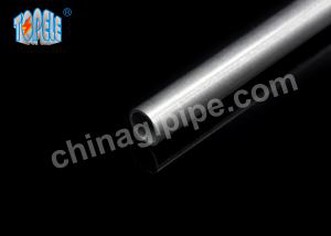Rigid Galvanized Steel Conduit, often referred to simply as "rigid conduit" or "RMC" (Rigid Metal Conduit), is a type of electrical conduit used in commercial, industrial, and even some residential electrical installations. It is made from galvanized steel and is designed to protect and route electrical wiring and cables in a highly durable and secure manner.
Key characteristics and uses of rigid galvanized steel conduit include:
Material: Rigid galvanized steel conduit is constructed from steel that has been galvanized with a layer of zinc. The galvanization process adds a protective coating to the steel, making it resistant to corrosion and rust.
Rigidity: Rigid conduit is, as the name suggests, rigid and non-flexible. It is designed to maintain its shape and protect electrical conductors from physical damage, even in challenging environments.
Threaded Connections: Rigid conduit uses threaded connections and fittings for secure and reliable assembly. This allows for easy attachment of fittings, connectors, couplings, and other components.
Indoor and Outdoor Use: Rigid galvanized steel conduit can be used in both indoor and outdoor applications. Its corrosion resistance makes it suitable for wet and harsh environments.
Heavy-Duty Protection: RMC is often chosen for applications that require a high level of protection for electrical conductors, such as in industrial facilities, utilities, and other demanding settings.
Sizes: It is available in a variety of sizes, ranging from 1/2 inch to 6 inches in diameter, allowing for the accommodation of different wire and cable requirements.
Electrical Codes: Rigid conduit is typically installed in compliance with electrical codes and standards, and inspections are often carried out to ensure proper installation.
Rigid galvanized steel conduit is a popular choice for applications where the robustness and durability of a steel conduit are essential. It is often used to protect electrical wiring in areas where the conduit may be exposed to physical impact, moisture, or other environmental factors. The threaded connections and rigid nature of this conduit make it a secure and reliable option for electrical installations.






